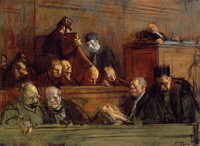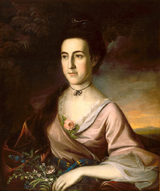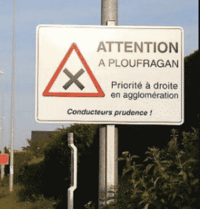La Cour Montclair
The Judicial Republic of La Cour Montclair La République Judiciaire de La Cour Montclair | |
|---|---|
| Motto: Le Droit est Notre Bouclier The Law is Our Shield | |
| Status | Protectorate State |
| Capital | Périgue |
| Official languages | French Empireedian |
| Religion | TBA |
| Demonym(s) | Montclairan |
| Government | Judicial Republic |
• Chief Justice | François Mercier |
• Associate Justice | List
|
• Keeper of the Peace | Renard Percival |
| Establishment | |
• Colony of Empireedy | February 15, 1542 |
• Independent State | July 17, 1757 |
• Protectorate of Empireedy | September 9, 1757 |
| Population | |
• 2022 census | 32,543,216 |
| Currency | Franc (FRC) |
| Date format | dd/mm/yyyy |
| Driving side | left |
| Calling code | +2 |
| Internet TLD | .lu |
La Cour Montclair, officially the Judicial Republic of La Cour Montclair (French:La République judiciaire de La Cour Montclair), commonly referred to as simply Montclair is a protectorate nation of Empireedy situated on Southern Elisia. Montclair is unique in that it is ruled by a panel of judges, making it the only Judicial Republic on Telrova. Despite being a protectorate nation of Empireedy, Montclair maintains a distinct identity and is known for its unique way of governance which spawns from earlier times as a collection of city-states.
Etymology
The name "La Cour Montclair" has a significant meaning within the context of the nation's history. As the only Judicial Republic in the world, Montclair's form of government is based on a panel of judges who make decisions for the nation. The name "La Cour Montclair" literally translates to "The Court of Montclair" in French, reflecting the judiciary roots of the nation. The name also pays homage to the important role that the judiciary plays in the country's governance and decision-making processes.
History
Before the arrival of Empireedy in the 16th century, La Cour Montclair operated under a decentralized governance structure based on community-based legal systems. The region was divided into city-states, each with its own judge responsible for overseeing legal proceedings within the city. Despite being independent, the city-states of La Cour Montclair maintained a sense of unity and cooperation through a council of judges. This council would meet regularly to discuss matters of common interest and to make decisions that would affect the entire nation. This system allowed for a degree of local autonomy while also ensuring that decisions were made in the best interests of the entire nation. The legal system of La Cour Montclair during this time was based on the principles of equity and fairness. Judges were responsible for interpreting the law and making decisions based on their understanding of what was right and just. This system relied on the wisdom and experience of judges, who were expected to make decisions that reflected the values of their community.
The establishment of La Cour Montclair as a colony under Empireedy in 1542 was a significant moment in the history of the nation. At the time of its founding, the region was sparsely populated and offered a wealth of natural resources, making it an attractive target for colonial expansion. Under Empireedy's control, La Cour Montclair grew rapidly, with new settlers arriving from the nation to take advantage of the region's opportunities. The colony was initially focused on resource extraction, particularly timber and mineral resources, which were in high demand in Empireedy.
However, the arrival of Empireedy also marked a significant change in the governance structure of La Cour Montclair. The Empireedy government established a centralized system of governance, with a governor appointed to oversee the colony and enforce the laws of the Empire. This system represented a significant departure from the decentralized governance structure that had existed in La Cour Montclair prior to Empireedy's arrival. The city-states were dissolved, and the judges lost much of their autonomy, now serving as officials of the Empireedy government rather than representatives of their local communities.
Despite these changes, the legal system of La Cour Montclair continued to be based on being overseen by a panel of judges on the national level. However, the judges now operated within a more formalized legal system, following the laws and regulations of Empireedy rather than making decisions based solely on their own interpretation of what was right and just. This panel was appointed by the governor, and was responsible for interpreting and enforcing the laws and regulations of the Empireedy government. Under this new system, the judges were no longer elected by their local communities, and they no longer had the same level of autonomy they had enjoyed under the previous decentralized governance structure. Instead, they were expected to operate within the framework of the Empireedy legal system, and to make decisions based on the laws and regulations set out by the Empireedy government.
The collapse of the Empireedy monarchy in 1757 had significant consequences for La Cour Montclair. With the collapse of the central authority, the nation was thrust into a period of chaos and uncertainty. During this time, La Cour Montclair faced a number of challenges, including economic instability, political unrest, and social upheaval. While the Judges panel was maintained, one of the key changes that was made to the legal system during this time was the transformation of the judges panel from an appointed body to an elected one. The exact details of how the election of judges in La Cour Montclair worked during this time period are not clear, as they may have varied over time and depending on the specific circumstances. However, it was soon established as the winner of the election would be selected based on receiving a majority or plurality by an electorate of all eligible citizen to serve for life unless recalled.
However, La Cour Montclair soon found itself in a precarious position. Without the support of a larger nation, it was vulnerable to attack from other regional powers, and lacked the diplomatic connections needed to secure trade agreements and other international relationships. In light of these challenges, the nation decided to seek the protection of the new Empireedy government, which had recently been established after the collapse of the monarchy. On September 9, 1757, La Cour Montclair sent a delegation to Empireedy to negotiate the terms of a protectorate agreement. This agreement would establish Empireedy as the protector of La Cour Montclair, providing military and diplomatic support in exchange for certain concessions and obligations from the smaller nation related to defense, trade, and taxation.
By entering into this protectorate agreement, La Cour Montclair was able to secure the support and resources it needed to thrive in the face of external threats and international competition. While it relinquished it's short-lived independence, La Cour Montclair still managed to maintain most of it's autonomy under the new agreement.
Government
The country is governed by a panel of judges who have complete authority over the country's legal system and governance. The judges of La Cour Montclair are elected by the people through a democratic process. They are chosen for their legal expertise, wisdom, and impartiality, and serve for a term of ten years. During their time in office, they are responsible for interpreting and applying the law in a fair and just manner, and for making decisions that reflect the values and needs of the people.
In addition to the panel of judges, the modern government of La Cour Montclair includes a number of other institutions and bodies. These include a council, which is responsible for passing laws ad administering court activities, a system of lower courts which provide a mechanism for resolving legal disputes and ensuring that justice is served, and the principal law enforcement agency known as the TBA which is resposnbily for enforcing judicial policy. As the principal law enforcement agency in La Cour Montclair, the Hall of Justice plays a critical role in maintaining law and order throughout the nation. The agency works in conjunction with the high courts to ensure that the rulings and decisions of the judges are carried out and enforced. The Hall of Justice is responsible for investigating crimes, making arrests, and bringing suspects to trial. It also provides security for courtrooms and other government facilities, as well as for important public events.
The Hall of Justice is overseen by a Chief, who is appointed by the panel of judges. The chief is responsible for managing the agency and ensuring that it operates efficiently and effectively. The agency is divided into several divisions, each of which is responsible for a specific area of law enforcement. For example, there are divisions for investigations, patrol, and special operations.
Demographics
Population
As of 2022, the population of La Cour Montclair is estimated to be around 32 million people. The population is relatively evenly distributed across the country, with the largest concentration of people living in the Périgue metropolitan area and other urban centers such as Belle-Vue, Les Cerisiers, and Roche. The La Cour Montclair population of has grown steadily over the years, although the rate of growth has slowed down in recent years. La Cour Montclair has a relatively high life expectancy and a low infant mortality rate, which has contributed to the country's population growth.
The population of La Cour Montclair is fairly diverse, with significant populations of people from various ethnic backgrounds. The majority of the population is of Elisian descent, particularly Empireedy and other Southern Elisian ethnic groups. However, it is important to note that the Montclair government does not officially collect data on ethnic or racial identity, as the country emphasizes the principle of equality and does not recognize ethnic or racial categories in its census or official documentation.
Fertility
The total fertility rate in La Cour Montclair has remained high and is today considerably higher than that of most contemporary nations in Elisia. It is largely responsible for the rapid population growth of La Cour Montclair. The fertility rate in La Cour Montclair is relatively high compared to other countries and territories in the region. The total fertility rate in La Cour Montclair was 3.6 births per woman in 2020. However, the fertility rate in La Cour Montclair has been declining over the past few decades, from a high of 4.2 births per woman in the early 1980s. This decline is largely due to the increasing availability and use of family planning services in the department. The government of La Cour Montclair has implemented policies to promote family planning and reproductive health, including increasing access to contraceptives and providing education about reproductive health. Despite the decline in fertility, La Cour Montclair still has a relatively young population, with around 40% of the population under the age of 20. .
| 1999 | 2000 | 2001 | 2002 | 2003 | 2004 | 2005 | 2006 | 2007 | 2008 | 2009 | 2010 | 2011 | 2012 | 2013 | 2014 | 2015 | 2016 | 2017 | 2018 | 2019 | 2020 | 2021 | |
|---|---|---|---|---|---|---|---|---|---|---|---|---|---|---|---|---|---|---|---|---|---|---|---|
| La Cour Montclair | 3.87 | 3.93 | 3.79 | 3.73 | 3.77 | 3.47 | 3.79 | 3.80 | 3.73 | 3.57 | 3.49 | 3.37 | 3.42 | 3.60 | 3.47 | 3.44 | 3.44 | 3.61 | 3.93 | 3.82 | 3.71 | 3.61 | 3.87 |
Language
The official languages of La Cour Montclair is French, which is spoken by the vast majority of the population, and Empireedian, which is still mandated to be taught in schools. In addition to French and Empireedian, there are also regional languages and dialects spoken throughout the country aging back to the times of it's City-States era. However, French and Empireedian are the only official languages recognized by the Montclair government.
Education
Education in La Cour Montclair is highly centralized and is overseen by the Ministry of National Education. Education is compulsory for children between the ages of 6 and 16, and the system is divided into three main stages: primary education, secondary education, and higher education.
Primary
Primary education in La Cour Montclair is mandatory for all children aged 6 to 11 years old. Students receive a broad education in subjects such as mathematics, French, history, geography, science, and physical education. Primary education is designed to provide a solid foundation for further studies and to help develop important life skills such as critical thinking, problem-solving, and creativity.
Secondary
Secondary education in La Cour Montclair is divided into two main stages. TBA is mandatory for all students aged 11 to 15 years old, and TBA is for students aged 15 to 18 years old. During these years, students receive a more specialized education in subjects such as literature, foreign languages, mathematics, science, history, and geography. At the end students take a national exam that determines their eligibility for higher education.
Higher
Higher education in La Cour Montclair is provided by universities and specialized schools. Admission is is highly competitive, and graduates are highly sought after in the job market. La Cour Montclair universities offer a range of programs in fields such as science, engineering, medicine, law, and the humanities. Tuition fees for higher education are relatively low compared to other countries, and financial assistance is available to students in need.
Health
The La Cour Montclair healthcare system is based on a mix of public and private hospitals and clinics. Public hospitals provide free or low-cost healthcare to all residents, while private hospitals offer a range of services for those who can afford to pay. The La Cour Montclair government regulates the healthcare system and sets prices for medical procedures, medications, and healthcare services. Residents of La Cour Montclair are required to have health insurance, which can be obtained through either the government-run social security system or private insurance companies. The social security system covers the majority of healthcare costs, with patients responsible for a small co-payment for each medical service. Private insurance can cover additional services, such as private hospital rooms or alternative therapies.
Religion
Urbanization
La Cour Montclair is a highly urbanized country, with the majority of the population living in urban areas. Approximately 80% of the population lives in urban areas, with the largest cities being Périgues, Belle-Vue, Les Cerisiers, and Roche The process of urbanization in La Cour Montclair began in the 19th century with the growth of industrialization and the migration of people from rural areas to cities in search of work. This trend continued throughout the 20th century, with rapid urbanization fueled by population growth, economic development, and modernization. Today, La Cour Montclair has a well-developed network of cities and towns, with a range of urban centers that vary in size and function. Périgues is the largest and most important city, serving as the political, economic, and cultural capital of La Cour Montclair.
Economy
As a part of Empireedy's sphere, the economy of La Cour Montclair is closely tied to that of Empireedy, and is heavily influenced by it's policies and funding. In 2022, La Cour Montclair's GDP was approximately ₣4.7 billion ($5.5 billion), which represents a per capita GDP of ₣15,235 ($17,918). However, these figures should be interpreted with caution as the GDP of La Cour Montclair is heavily influenced by transfers from the Empireedy government. The industrial sector in La Cour Montclair is relatively small, accounting for around 10% of the nation's GDP. The primary industries in La Cour Montclair include gold mining, forestry, and construction.
Industry and Services
Gold mining is one of the most important industries in La Cour Montclair, and it is responsible for the majority of the department's exports. Gold mining is carried out by a combination of large-scale industrial mining operations and small-scale artisanal mining. The Empireedy government tightly regulates gold mining in La Cour Montclair to ensure that it is carried out in an environmentally sustainable and socially responsible manner. The forestry industry in La Cour Montclair is small but significant, with timber being the second-largest export after gold. The industry is dominated by small-scale operators who harvest and process wood from the forest. The government of La Cour Montclair has implemented measures to ensure that logging is carried out sustainably and does not damage the delicate ecosystem. The construction industry in La Cour Montclair is small but growing, as the department invests in infrastructure projects such as new roads, schools, and hospitals. The construction industry is dominated by local firms, but there are also a few large companies that operate in La Cour Montclair.
The services sector is the largest part of the La Cour Montclair economy, accounting for around 70% of GDP. Key industries include government services, retail, and tourism. The government of La Cour Montclair is a major employer, providing a range of services such as education, health care, and public administration. The government is also responsible for managing the department's infrastructure, including its ports and airports. Retail is a significant industry in La Cour Montclair, with a large number of small businesses and several major supermarket chains. Transportation is a significant industry in La Cour Montclair, the nations's transportation infrastructure includes an extensive public transport network, an international airport, and several smaller airports and airstrips throughout the nation.
Trade
La Cour Montclair has a small economy and limited trade opportunities due to its land locked location and its status as a protectorate of Empireedy. The majority of La Cour Montclair's trade is with Empireedy with smaller amounts of trade with neighboring countries. La Cour Montclair's exports are dominated by gold, which accounted for around 80% of exports in 2022. Other key exports include iron, timber, and rum. Most of these exports are destined for Empireedy, with smaller amounts going to other countries in Elisia.
La Cour Montclair's imports are dominated by food, fuel, and consumer goods. Most of these imports come from Empireedy, although there is also a significant amount of trade with neighboring countries. La Cour Montclair has a negative trade balance, as its imports are larger than its exports. However, La Cour Montclair benefits from financial transfers from Empireedy, which help to offset the trade deficit.
Military, police, and security forces
The Empireedy government maintain a significant presence in La Cour Montclair, with a range of military units and facilities located throughout the territory. One of the most important military installations in La Cour Montclair is the Cayenne military base, which serves as the headquarters of the 3rd Foreign Infantry Regiment. The 3rd Foreign Infantry Regiment is a part of the Empireedy Foreign Legion, which is a branch of the Empireedy Army composed of foreign volunteers. The regiment is responsible for defending La Cour Montclair's borders and maintaining security within the territory. Its soldiers are trained in a variety of combat and security tactics, and are equipped with a range of advanced weapons and equipment. In addition to the 3rd Foreign Infantry Regiment, the Empireedy Armed Forces also maintain a number of other military units in La Cour Montclair, including the Empireedy Air Force. The Empireedy Air Force operates a base at Rochambeau Airport near Cayenne, which is used for air surveillance, transport, and search and rescue operations.
The Gendarmerie Nationale is the primary law enforcement agency in La Cour Montclair, responsible for maintaining public order and investigating crimes. They are part of the La Cour Montclair National Police and have a significant presence throughout the country. The Gendarmerie in La Cour Montclair is composed of both mobile and fixed units, and has a range of specialized teams and divisions to deal with different types of crime and security threats. They work in close cooperation with other law enforcement agencies, such as the Customs Service and the local police force, to ensure public safety and security. One of the key roles of the Gendarmerie is to combat illegal activity, such as drug trafficking, smuggling, and other types of organized crime. They operate a number of checkpoints and patrols throughout the territory, and work closely with other law enforcement agencies to identify and apprehend criminals.
The Gendarmerie is also responsible for maintaining public order and responding to emergencies, such as natural disasters and civil unrest. They have a range of specialized units, including riot control teams and bomb disposal experts, that are trained to handle a variety of crisis situations.







